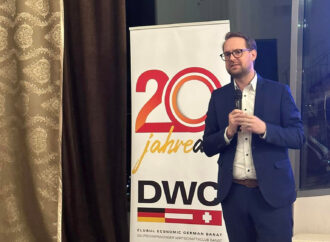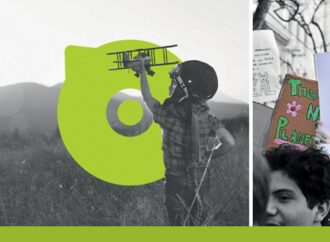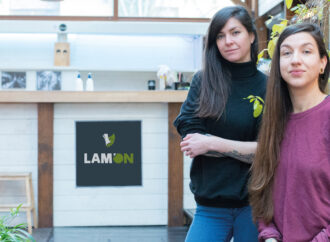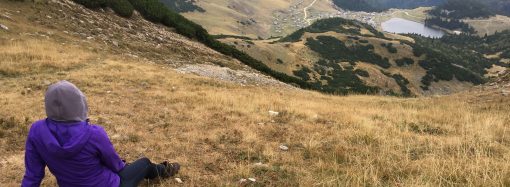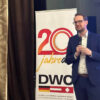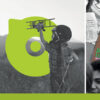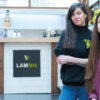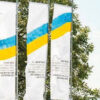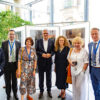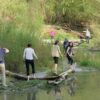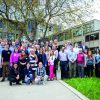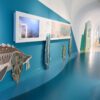The Interreg project “LENA – Local Economy and Nature Conservation in the Danube Region” aims to build an important bridge in the Danube region: strengthening local economy and local nature conservation at the same time. In this way, all participants should benefit from sustainability. LENA has set itself the task of uniting people and nature
The Interreg project “LENA – Local Economy and Nature Conservation in the Danube Region” aims to build an important bridge in the Danube region: strengthening local economy and local nature conservation at the same time. In this way, all participants should benefit from sustainability.
LENA has set itself the task of uniting people and nature across seven Danube countries and eleven nature reserves, as well as developing approaches for the conservation and sustainable use of protected areas. A total of 17 partners are involved, including the WWF organisations from Bulgaria, Romania and Hungary, the Danube Office Ulm/Neu-Ulm, the City of Tuttlingen, the Centre for Regional Studies in Odessa and DANUBEPARKS – The Network of Danube Protected Areas. The project is funded with around 2.5 million euros from the European Regional Development Fund. It started in January 2017 and will run until June 30 2019.
During the last two and a half years the exchange of experience and know-how between the partners enabled sustainable economic development in nature conservation areas. Five different types of pilot actions were implemented:
utilizing wild plants as a sustainable source of income, fishing as an economic livelihood, value creation through sustainable agriculture, cross-border training of touristic guides “Danube Guides”, as well as installing electric charging stations for e-bikes along nature routes.
Recognising, utilising and conserving natural and cultural heritage
The project areas covered over 375,000 ha with special ecosystems and untapped potential for sustainable economic use. LENA affects about half a million people, most of whom live in economically weak communities struggling with emigration and the consequences of an ageing society. To tackle these challenges partners include not only nature conservation experts, but also representatives of local economic development agencies, NGOs and local municipalities.
The development of know-how for the conservation and sustainable use of protected areas is being worked on through policy recommendations, pilot actions and the development of four guidance documents – for communicating to local people and visitors the value of nature to the local economy, capacity building for sustainable use of natural and cultural heritage , increasing market access of sustainably sourced natural products and mobilising finances for conservation, nature-based jobs and business models. In this way, the project aims to recognise and preserve the diverse advantages of the nature reserves for the future.
LENA’s tourist activities include the purchase of e-charging stations and e-bicycles and the “Danube Guides”. These guides help tourists discover the natural and cultural heritage along the Danube with all their senses. It is the long term goal to establish an international network, under the leadership of the Danube Office Ulm/Neu-Ulm, that communicates the importance of conserving the natural and cultural values of the region to the public. During the first five-day training course in April 2018 in the Donau-Auen National Park, 15 participants from six countries were trained as “Daube Guide” trainers. An important part of the training was awareness-raising on topics such as sustainable mobility and accessibility in order to be able to offer tours for people with disabilities. As disseminators, these trainers trained further “Danube Guides” in their home countries.
Traditional use of wild plants in the region
“LENA is a multifaceted project with which we want to strengthen the economic opportunities for the local population in and around protected areas in the Danube region,” explains Kirsten Palme, LENA programme manager at WWF Hungary. Therefore, the sustainable use of nature is promoted, e.g. through the cultivation of genetically unmodified soya in Serbia, the training of breeders of black Slavonian pigs in Croatia, the creation of a certification system for food from the Romanian Comana nature park as well as cooperation with fishermen in Bulgaria and Romania in order to make their work more sustainable. The pilot actions further include training on the sustainable use of wild plants, which are Kirsten Palme’s area of expertise: “The use of wild plants has a very long tradition in this region and is important for all of us, as these raw materials are also used commercially in everyday products such as herbal teas and cosmetics”.
German award for LENA
This noble mission was rewarded with a prize in 2018: in September, the German Regional Network Units for Sustainability Strategies (“RENN”) awarded LENA with the title “Sustainability Project 2018”. The project was selected among over 450 competitors and was awarded € 1,000 in prize money. “LENA has made it its mission to develop integrated approaches and strategies for the sustainable use of protected areas, to improve income opportunities based on nature and to promote the sustainable use of natural resources”, the jury explains.
Daniel Hirsch,
journalist, Budapest
The Project LENA – Local Economy and Nature Conservation in the Danube Region is co-funded by the European Regional Development Fund (ERDF), the Instrument for Pre-Accession Assistance II (IPA II) in the framework of Danube Transnational Programme Interreg. www.interreg-danube.eu/lena



